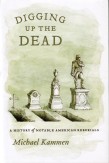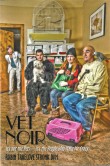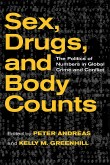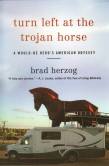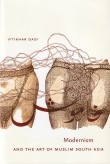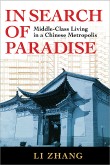CORNELL BOOKS
Epic journeys, grave tales and vet views, stats that lie, protecting children, China's new revolution and art of decolonization
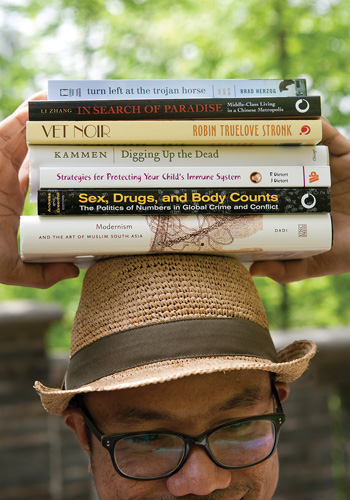
Final resting places
A funeral closes a life story, and a grave marks its end forever. But what happens when those left behind don't agree about the meaning of that story? Or when that disagreement extends all the way to arguments about the final resting place itself? In a surprising number of cases over the years, that's when people have chosen to grab shovels and start digging. In "Digging Up the Dead: A History of Notable American Reburials" (University of Chicago Press, 2010), Pulitzer Prize-winning historian and Cornell professor emeritus of history Michael Kammen reveals a treasure trove of surprising and sometimes gruesome stories of exhumation and reburial throughout American history. Taking us to the contested burial sites of such figures as Sitting Bull, John Paul Jones, Frank Lloyd Wright, Daniel Boone, Jefferson Davis and even Abraham Lincoln, Kammen explores how complicated interactions of regional pride, shifting reputations and evolving funerary practices led to public, often emotional, battles. Grave-robbing, skull-fondling, cases of mistaken identity and the financial lures of cemetery tourism all come into play as Kammen delves deeply into this little-known – yet surprisingly persistent – aspect of American history. The book reminds us that the stories of America's past don't always end when the key players pass on. Rather, the battle – over reputations, interpretations and possession of the remains themselves – is often just beginning.The guinea pig that complained over the phone
In her memoir "Vet Noir: It's Not the Pets – It's the People Who Make Me Crazy" (iUniverse, 2010), a seasoned veterinarian recounts stories of animals she treated and the people who loved them. Robin Truelove Stronk, DVM '75, owned a veterinary practice in Vermont with her husband for 24 years and often dealt with clients who expected too much, listened too little, arrived too late – and sometimes just fainted.
With an entertaining style, Stronk shares not only her own professional challenges, but also the unique expectations of the animals' owners. From a New England dairy farmer who expected her to strip to the waist to assist his cow with a difficult birth to the distraught caller who held her complaining guinea pig up to the telephone for an over-the-line diagnosis, Stronk's anecdotes illuminate the sometimes tortuous, yet often affecting relationships between a pet, its owner and the veterinarian.
Stronk and her husband now live on a farm in New Hampshire. She describes filling her time by creating art and frolicking with cats.
Devil's in the (numerical) details
Statistics are frequently used in policy debates and by the media to signify the magnitude or seriousness of problems. Too often they are, to paraphrase Disraeli, lies or damned lies.
According to "Sex, Drugs and Body Counts: The Politics of Numbers in Global Crime and Conflict" (Cornell University Press, 2010), edited by Peter Andreas (M.A. '95, Ph.D. '99) and Kelly M. Greenhill, policymakers and the media naively or deliberately accept highly politicized and questionable statistics. The problem is particularly pronounced in statistics relating to the politically charged realms of global crime and conflict, numbers of people killed in massacres and genocides, the size of refugee flows and the magnitude of the illicit global trade in drugs. Using political scientists, anthropologists, sociologists and policy analysts, the book critically examines the murky origins of some of these statistics. It also assesses the effectiveness of metrics used by Washington to evaluate terrorist financing, sex trafficking and the drug trade.
Revising a Homeric quest – in a Winnebago
It all began with an invitation to Reunion Weekend on the hill. "When asked to revisit where you have been, you tend to assess where you are," writes author Brad Herzog '90 in "Turn Left at the Trojan Horse," the third in his trilogy of small-town America travel memoirs. "When midlife approaches like a mugger in an alleyway, you don't merely take stock of your life; you recall your original goals – and perhaps you notice the gulf between the former and the latter." So Herzog, who also writes children's books, wondered: How has he measured up to his own youthful aspirations? In contemporary America, what is a life well lived? What is a heroic life?
To answer those questions, he undertook a journey inspired by Odysseus' epic voyage home to his isle of Ithaka – except that Herzog's vessel was a 25-foot Winnebago. Starting in the foothills of Washington's Mount Olympus and stopping in classically named towns, he delved into the lives of everyday heroes, including a teacher in a one-room rural schoolhouse in Troy (Oregon) and a bomb-defusing soldier from Sparta (Wisconsin).
"Turn Left at the Trojan Horse" (Citadel Press, 2010) is a historical, philosophical and conversational trek across America and through the universal truths of the ancient myths. In the end it is simply the story of one man trying to find his way.
Decolonization's art and artists
Art historian Iftikhar Dadi's pioneering book "Modernism and the Art of Modern South Asia" (University of North Carolina Press, 2010) explores the work of major artists from the late British colonial period in the Indian subcontinent to the present. Dadi, a Cornell assistant professor of art, looks at the diverse production of artists from the region that is now Pakistan, providing insights to the area's nationalism, modernism, cosmopolitanism and tradition. He examines how artists developed by reworking traditional approaches to the classical Islamic arts and engaging with the region's intellectual history. Dadi shows how artists addressed the dramatic social and aesthetic transformations that accompanied decolonization.
The Chinese middle-class revolution
A new revolution has been sweeping the booming cities of China. This time the main actors are not peasants and proletarians but middle-class professionals and entrepreneurs in search of a private paradise in a society now dominated by consumerism. They hope to find material comfort and social distinction in newly constructed gated communities.
In her book "In Search of Paradise: Middle-Class Living in a Chinese Metropolis" (Cornell University Press, 2010), Li Zhang (M.S. and Ph.D. '98) looks at how this quest for home ownership and the good life is profoundly transforming the physical and social landscapes of urban China. Zhang, who is from Kunming, the capital of Yunnan province, turns a keen ethnographic eye on her hometown.
Protecting children's vulnerable immune systems
Exposure to pollutants, allergens, drugs and potentially harmful elements in the diet can damage the immune systems of embryos, babies and older children, says Cornell toxicologist Rodney R. Dietert, a professor of immunotoxicology in the College of Veterinary Medicine.
To help parents as well as physicians, Dietert and wife Janice have written "Strategies for Protecting Your Child's Immune System: Tools for Parents and Parents-to-Be" (World Scientific Publishing Co., 2010).
"It provides science-based information and specific strategies to help parents proactively protect their child's immune system," says Rodney Dietert.
The book, intended for a general audience, covers environmental pollutants, over-the-counter and prescription drugs, vaccinations, infections, pets, hygiene, stress, maternal and childhood diets, and safety testing of chemicals and drugs. It also discusses a number of diseases and conditions from childhood asthma to allergies, and provides information about disease triggers and strategies for preventing immune system damage.
